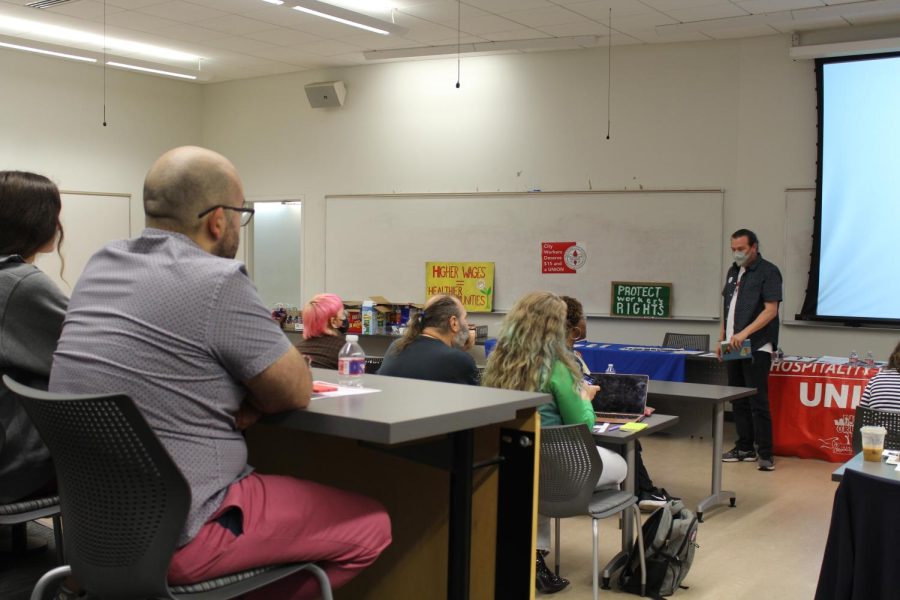Labor Spring event sees local union leaders speak
Dave Cash from the United Teachers New Orleans makes an appearance at Loyola’s first Labor Spring on April 21, 2023.
May 3, 2023
Local union leaders, workers, and Loyola faculty gathered in a Monroe Hall lecture room to discuss the ongoing history of collective labor organizing.
The event was introduced by sociology professor Cody Melcher and included delegates from labor unions such as Unite Here, the Workplace Justice Project at Loyola Law, United Teachers New Orleans, Painters and Glaziers union, New Orleans Workers Assembly, New Orleans City Workers Organizing Committee, and union nurses from the downtown Tulane Medical Center.
Delegates and workers discussed topics ranging from labor law successes to the possible closure of Tulane’s downtown medical center.
The labor spring event comes at a time when union membership has reached a historic low, with only around 10% of workers in the United States being members since 2021. The decline in union membership, Melcher showed, was directly contrasted with income inequality, which is at its highest since 1940, insinuating that when union membership is low, income inequality increases.
Melcher used Starbucks as a prime example of the growing interest in union membership across the country and subsequent corporate crack-down on organizing. Melcher said that in August of 2021, zero Starbucks were unionized. By May 2022, 250 locations had unionized, including the Starbucks on Maple Street, the first Starbucks in Louisiana to unionize.
The Starbucks on Poydras Street could also become the second unionized Starbucks in New Orleans. Additionally, he mentioned the Rutgers University faculty strike to illustrate the power unions have. Melcher said that their strategy was as simple as relying on the fact that a university can’t teach without teachers.
Today, unions have the highest public approval rating since 1965. From rapid unionization efforts of Starbucks and Amazon warehouses across the country to the Smoothie King Center here in New Orleans, unions are becoming more and more active and militant. The Unite Here union at the Smoothie King Center recently signed a deal to significantly increase wages. Additionally, the Sodexo unionization effort on campus has reached a majority of the workplace signed onto the unionization petition, according to the delegate at the event, meaning they can now hold a proper election to unionize. This, however, has not deterred them from attempting to secure an even larger majority to further secure the union’s existence and legitimacy.
Melcher began the event by giving a brief history of labor and desegregation at Loyola, specifically by highlighting Father Louis Twomey, Loyola graduate and leader of the labor institute on campus. He is also a candidate proposed by the Street Renaming Commission to replace Calhoun Street.
Twomey refused to follow racist Loyola policies of segregation and held interracial courses at the institute. This became the first instance of integrated education on a college campus in the deep south since Reconstruction and helped lead the university to desegregation in 1952. Twomey was instrumental in the unionization of Black sugar sharecroppers in Louisiana. He also helped organize an agricultural workers union and played a major role in the repeal of the state’s right-to-work law, a law that decreases unionization rates by 4% and wages by 1%.
“I see this labor spring event as the reigniting of the flame of Loyola’s institutional dedication to the labor movement,” Melcher said.
Erika Zuker from the Workplace Justice Project also spoke at the event and discussed labor law and the National Labor Relations Board. Zuker highlighted section seven of the National Labor Relations Act, which protects the right to unionize and to engage in other “concerted efforts” to improve working conditions.
Zuker said it is important to protect a worker’s right to organize by forbidding employers from obstructing worker organizing, regardless if it is to unionize or not.
One of the other delegates to come speak was a worker from the Smoothie King Center, which recently secured a wage increase because of their union. The delegate said that the union provided support for the workers.
“You sign with us, we’ll back you up,” the delegate said, remarking how the union spoke to her.
Additionally, she said the union provides a voice for those who are afraid of speaking up.
“The union stands behind you and gives you a voice. If you can’t speak for yourself, you have support for when you try to speak,” she said.









